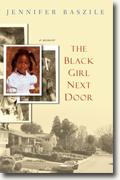The Black Girl Next Door
Jennifer Baszile
book reviews:
· general fiction
· chick lit/romance
· sci-fi/fantasy
· graphic novels
· nonfiction
· audio books
· author interviews
· children's books @
curledupkids.com
· DVD reviews @
curledupdvd.com
newsletter
win books
buy online
links
home
for authors
& publishers
for reviewers

 |
The Black Girl Next Door: A Memoir Jennifer Baszile Touchstone Hardcover 320 pages January 2009 |
|
Barry and Janet Baszile made every effort to give their daughters the advantages we all want for our children – a safe home, a good education, and a strong sense of self-worth. The best schools are almost always located near upscale (read: predominantly white) neighborhoods, and it was into such a community that the black Baszile family settled when their younger daughter Jennifer was still in first grade. It was only a matter of time before racist graffiti appeared on their property, of course.
The Basziles walked a narrow line between pride in their heritage and accomplishments and the white world that surrounded them. For adults, the balancing act is difficult; for Jennifer and other children, it was a constant source of confusion. Jennifer is frequently baffled by behavior and words from the adults around her that are in direct opposition to her reality. At times, the successful, well-educated, attractive family is referred to as the “real life Huxtables,” yet Jennifer knows that they are nothing like the fictional and happy Cosby Show role models. One incident in particular is a Gordian knot of misperception, misunderstanding, and necessary compromise. On a holiday visit to her paternal grandmother’s home in Louisiana, Jennifer and her sister receive a warm welcome, a quick inspection, and then Grandmother declares that they are “just like perfect little white girls.” The author’s conclusion is that this was intended to be a compliment, and perhaps she’s right. Her mother’s response was a stiff ‘thank you,’ which suggests that she also understood it to be a compliment even though she did not view it as such. Or perhaps it was a slicing commentary on the way the Basziles lived – in a largely white neighborhood where Jennifer and her sister had only white children with whom to play and emulate. The Baszile parents try to instill in their girls an appreciation for the history of their family, both personal and cultural, but are often confronted with the need to back down for the sake of keeping the greater peace. Jennifer’s decision to dress as Harriet Tubman for her school’s Hero Parade was met with resistance not just from her teacher (who tried to steer her toward Rosa Parks instead) but also from her parents, who immediately recognized the threat that Tubman’s story could present to white schoolmates and their parents. While much of this coming-of-age story involves the usual adolescent dilemmas, the issues peculiar to a black girl in a white world always add an extra dose of complication. Her friends might strive to duplicate the Farah flip and fall short, but Jennifer’s black hair would never come close. Other girls’ first attempts to use make-up are seldom perfect, but make-up suited to Jennifer’s skin tone wasn’t even available in her town. The Black Girl Next Door Originally published on Curled Up With A Good Book at www.curledup.com. © Deborah Adams, 2009 |
|
|
|
 Click here to learn more about this month's sponsor! |
|
| fiction · sf/f · comic books · nonfiction · audio newsletter · free book contest · buy books online review index · links · · authors & publishers reviewers |
|
| site by ELBO Computing Resources, Inc. | |
 Though young, Jennifer had already experienced racism when a classmate explained that it was okay that Jennifer won their impromptu schoolyard race because “black people have something in their feet to make them run faster than white people.” Jennifer knew instinctively that the claim was nonsense and tried to confirm that with her teacher; instead, the teacher reiterated what the classmate had said. This prompted a visit to the school by Barry Baszile who, though able to draw an apology from the teacher, had experienced enough of such ignorance in his life to know that he couldn’t protect his children from every fearful bigot out there. This incident occurred in the 1970s, after the passage of civil rights legislation when a majority of Americans considered racial injustice a resolved issue. I mention the date here to place Jennifer Baszile’s memoir in context; without a timeframe, it could be mistaken for a current news item in our 21st-century post-Civil Rights oblivion.
Though young, Jennifer had already experienced racism when a classmate explained that it was okay that Jennifer won their impromptu schoolyard race because “black people have something in their feet to make them run faster than white people.” Jennifer knew instinctively that the claim was nonsense and tried to confirm that with her teacher; instead, the teacher reiterated what the classmate had said. This prompted a visit to the school by Barry Baszile who, though able to draw an apology from the teacher, had experienced enough of such ignorance in his life to know that he couldn’t protect his children from every fearful bigot out there. This incident occurred in the 1970s, after the passage of civil rights legislation when a majority of Americans considered racial injustice a resolved issue. I mention the date here to place Jennifer Baszile’s memoir in context; without a timeframe, it could be mistaken for a current news item in our 21st-century post-Civil Rights oblivion.